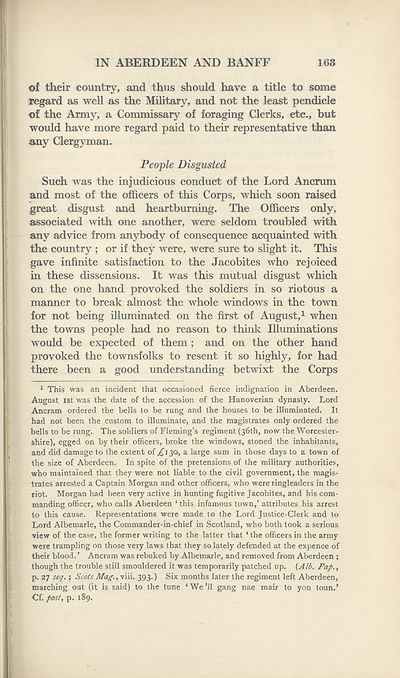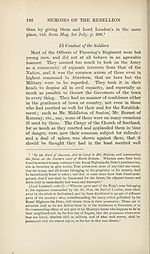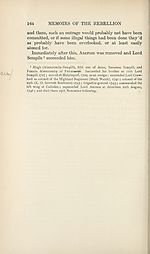Series 2 > Origins of the 'Forty-five
(260) Page 163
Download files
Complete book:
Individual page:
Thumbnail gallery: Grid view | List view

IN ABERDEEN AND BANFF
163
of their country, and thus should have a title to some
regard as well as the Military, and not the least pendicle
of the Army, a Commissary of foraging Clerks, etc., but
would have more regard paid to their representative than
any Clergyman.
People Disgusted
Such was the injudicious conduct of the Lord Ancrum
and most of the officers of this Corps, which soon raised
great disgust and heartburning. The Officers only,
associated with one another, were seldom troubled with
any advice from anybody of consequence acquainted with
the country ; or if they were, were sure to slight it. This
gave infinite satisfaction to the Jacobites who rejoiced
in these dissensions. It was this mutual disgust which
on the one hand provoked the soldiers in so riotous a
manner to break almost the whole windows in the town
for not being illuminated on the first of August,1 when
the towns people had no reason to think Illuminations
would be expected of them ; and on the other hand
provoked the townsfolks to resent it so highly, for had
there been a good understanding betwixt the Corps
1 This was an incident that occasioned fierce indignation in Aberdeen.
August 1st was the date of the accession of the Hanoverian dynasty. Lord
Ancram ordered the bells to be rung and the houses to be illuminated. It
had not been the custom to illuminate, and the magistrates only ordered the
bells to be rung. The soldiers of Fleming’s regiment (36th, now the Worcester¬
shire), egged on by their officers, broke the windows, stoned the inhabitants,
and did damage to the extent of ^130, a large sum in those days to a town of
the size of Aberdeen. In spite of the pretensions of the military authorities,
who maintained that they were not liable to the civil government, the magis¬
trates arrested a Captain Morgan and other officers, who were ringleaders in the
riot. Morgan had been very active in hunting fugitive Jacobites, and his com¬
manding officer, who calls Aberdeen ‘ this infamous town,’ attributes his arrest
to this cause. Representations were made to the Lord Justice-Clerk and to
Lord Albemarle, the Commander-in-chief in Scotland, who both took a serious
view of the case, the former writing to the latter that ‘ the officers in the army
were trampling on those very laws that they so lately defended at the expence of
their blood. ’ Ancram was rebuked by Albemarle, and removed from Aberdeen ;
though the trouble still smouldered it was temporarily patched up. (Alb. Pap.,
p. 27 seq.; Scots Mag., viii. 393.) Six months later the regiment left Aberdeen,
marching out (it is said) to the tune ‘We’ll gang nae mair to yon toun.’
Cf. post, p. 189.
163
of their country, and thus should have a title to some
regard as well as the Military, and not the least pendicle
of the Army, a Commissary of foraging Clerks, etc., but
would have more regard paid to their representative than
any Clergyman.
People Disgusted
Such was the injudicious conduct of the Lord Ancrum
and most of the officers of this Corps, which soon raised
great disgust and heartburning. The Officers only,
associated with one another, were seldom troubled with
any advice from anybody of consequence acquainted with
the country ; or if they were, were sure to slight it. This
gave infinite satisfaction to the Jacobites who rejoiced
in these dissensions. It was this mutual disgust which
on the one hand provoked the soldiers in so riotous a
manner to break almost the whole windows in the town
for not being illuminated on the first of August,1 when
the towns people had no reason to think Illuminations
would be expected of them ; and on the other hand
provoked the townsfolks to resent it so highly, for had
there been a good understanding betwixt the Corps
1 This was an incident that occasioned fierce indignation in Aberdeen.
August 1st was the date of the accession of the Hanoverian dynasty. Lord
Ancram ordered the bells to be rung and the houses to be illuminated. It
had not been the custom to illuminate, and the magistrates only ordered the
bells to be rung. The soldiers of Fleming’s regiment (36th, now the Worcester¬
shire), egged on by their officers, broke the windows, stoned the inhabitants,
and did damage to the extent of ^130, a large sum in those days to a town of
the size of Aberdeen. In spite of the pretensions of the military authorities,
who maintained that they were not liable to the civil government, the magis¬
trates arrested a Captain Morgan and other officers, who were ringleaders in the
riot. Morgan had been very active in hunting fugitive Jacobites, and his com¬
manding officer, who calls Aberdeen ‘ this infamous town,’ attributes his arrest
to this cause. Representations were made to the Lord Justice-Clerk and to
Lord Albemarle, the Commander-in-chief in Scotland, who both took a serious
view of the case, the former writing to the latter that ‘ the officers in the army
were trampling on those very laws that they so lately defended at the expence of
their blood. ’ Ancram was rebuked by Albemarle, and removed from Aberdeen ;
though the trouble still smouldered it was temporarily patched up. (Alb. Pap.,
p. 27 seq.; Scots Mag., viii. 393.) Six months later the regiment left Aberdeen,
marching out (it is said) to the tune ‘We’ll gang nae mair to yon toun.’
Cf. post, p. 189.
Set display mode to:
![]() Universal Viewer |
Universal Viewer | ![]() Mirador |
Large image | Transcription
Mirador |
Large image | Transcription
Images and transcriptions on this page, including medium image downloads, may be used under the Creative Commons Attribution 4.0 International Licence unless otherwise stated. ![]()
| Scottish History Society volumes > Series 2 > Origins of the 'Forty-five > (260) Page 163 |
|---|
| Permanent URL | https://digital.nls.uk/126862311 |
|---|
| Attribution and copyright: |
|
|---|
| Description | Over 180 volumes, published by the Scottish History Society, containing original sources on Scotland's history and people. With a wide range of subjects, the books collectively cover all periods from the 12th to 20th centuries, and reflect changing trends in Scottish history. Sources are accompanied by scholarly interpretation, references and bibliographies. Volumes are usually published annually, and more digitised volumes will be added as they become available. |
|---|


